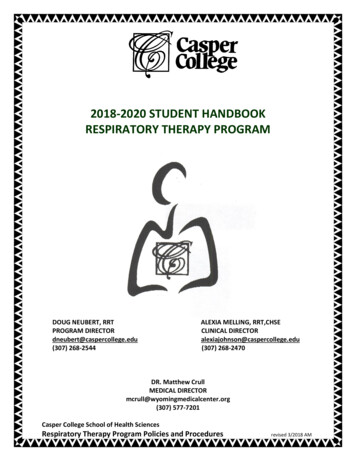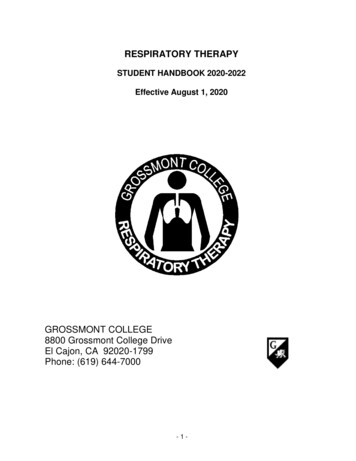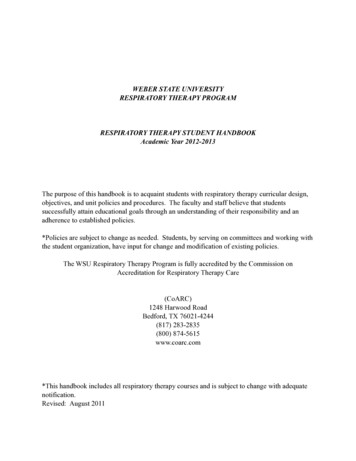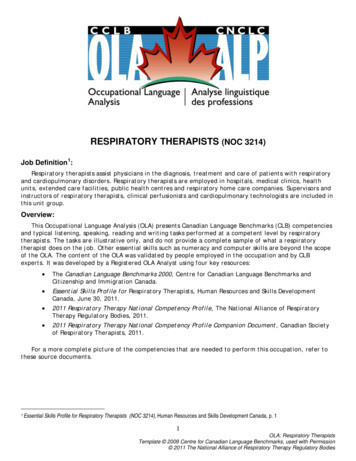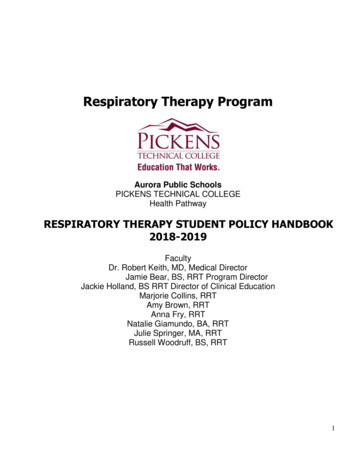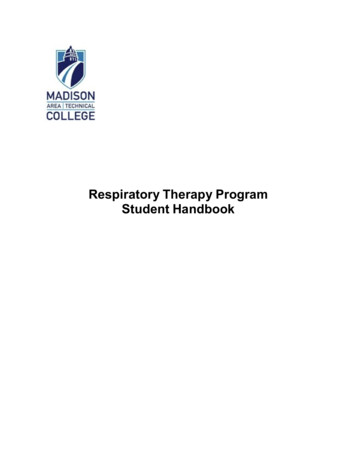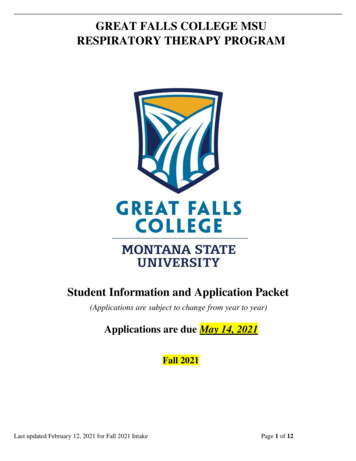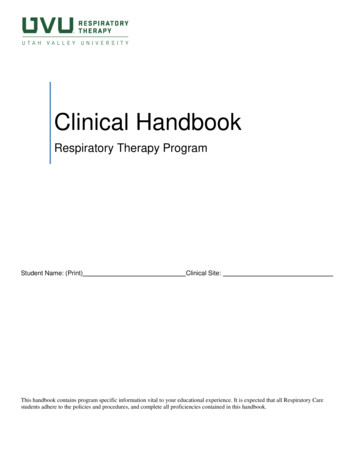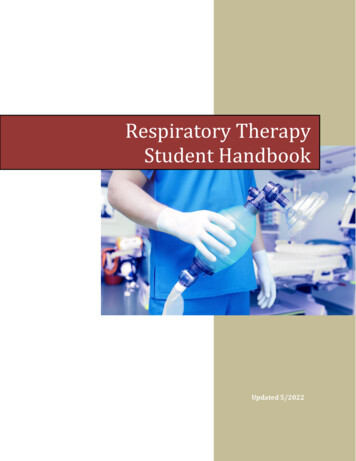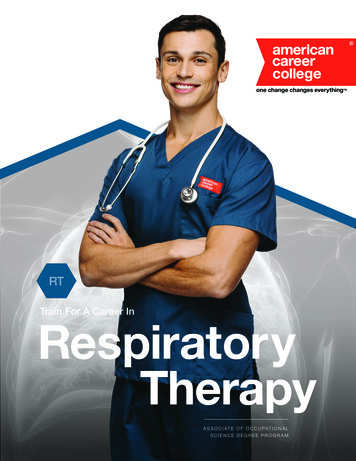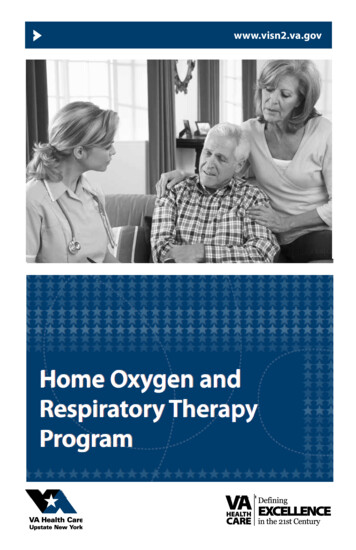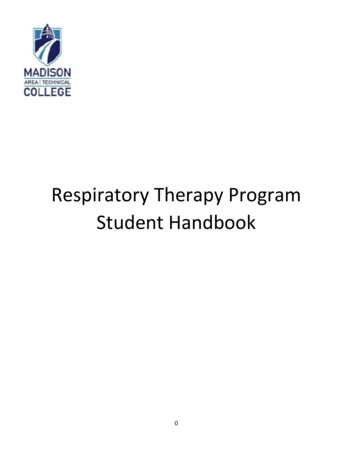
Transcription
Respiratory Therapy ProgramStudent Handbook0
Table of Contents:TopicFaculty WelcomeMadison College Mission, Vision and ValuesUnderstanding of Program Policies and ProceduresAccreditationProgram DescriptionProgram GoalsProgram OutcomesProgram VisionProgram PhilosophyDescription of CareerCredentialingBecoming a Licensed TherapistAdditional Program CostsExpectations and GuidelinesTransitioning to ProfessionalismProfessional DecorumProfessional IntegrityEducational LeadershipProfessionalism as a StudentRT ClubHelpful Hints For SuccessCurriculumTransfer of CreditsWithdrawal and Re-entryAuditing CoursesCastle BranchVaccinesDrug ScreeningFaculty AdvisingFacultyProgram PoliciesGrading PoliciesLate Assignments, Quizzes, Tests PoliciesClassroom Attendance and Tardy PolicyReasonable AccommodationsStudent Code of Conduct and Dismissal from ProgramElectronic Devices in ClassHIPAASocial Media Code of ConductFERPAStudy AreaStudent Hours and Open Lab1Page 1717171717181919
Self-Assessment ExamsAcademic Release (Disclosure) FormStudent EmploymentEssential FunctionsPregnancy PolicyAdvisory BoardClinical DescriptionClinical AffiliatesConference AttendanceClinical Dress CodePersonal HygieneClinical AttendanceAccommodation for Absence Due to Disability or IllnessConflict ManagementClinical Organizational ChartUse of Electronic Devices in ClinicalClinical Ethical PracticeClinical Course 1-5 Grading PolicyClinical SchedulingClinical Policy for Poor Student PerformanceAARC Statement of EthicsRespiratory Therapy Program Graduation RequirementsHandbook Verification 0
WelcomeThe Faculty welcomes you to the Madison College Respiratory Therapy Program.During your experience here, you will apply information from the classroom into the laboratory and clinical setting.You will develop and draw on many skills, from critical thinking to empathy. In the clinical setting every patient, everysituation is unique. You cannot memorize all the answers, but you will be expected to apply the Respiratory Care skillsthat you have learned.Your professional behavior is also essential. Those qualities, over and beyond the knowledge you gain and the skillsyou learn, are essential for your success in school and in your later work as a Respiratory Therapist. In broad terms,you will be expected to demonstrate respect for others, communicate effectively, cooperate with fellow workers, anddisplay the dependability expected of a professional. Give 100% and treat your classmates, instructors, patients, andco-workers, as you would like to be treated.Those who make the most of the program learn early on that the program faculty, clinical staff, instructors, and othercollege personnel work extremely hard to build a bridge for you to successfully graduate and realize your dream. Youcan become a Respiratory Therapist and enjoy a rewarding and successful career. It is up to you to be successful; weare here to help you achieve your goals.In our experience, we have come to know our success is dependent upon your success both in the program and inclinical practice after you graduate; therefore, we look forward to assisting you in your efforts to become aknowledgeable and skilled Respiratory Therapist.Sincerely,The Madison College Respiratory Therapy Program Faculty3
Madison College Mission, Vision and ValuesMission:Madison College provides open access to quality higher education that fosters lifelong learning and success within ourcommunities.Vision:To be the leader in accessible, affordable education that meets the evolving needs of our diverse communities.Values: ExcellenceRespectCommitment to students and diverse communitiesMaking Higher Education Available to AllMadison College is committed to diversity and does not discriminate. We strive to grow and sustain a culture whereall people are valued for who they are and who they will become. The nature of diversity includes but is not limited togender, race, sexual orientation, ethnicity, disability, age and religion. Each person is treated with respect, and allstudents are given the tools to find success.Understanding of Program Policies and Procedures:In order to ensure effective education in the Respiratory Therapy Program, each individual participating in theprogram must have a full understanding of the responsibility involved. The Respiratory Therapy Student Handbook isdesigned to provide the student with the necessary information regarding policies, procedures, and expectations inthe Respiratory Therapy Program. This handbook is meant to be a guide to assist the student in attaining their goal tobecome a competent Respiratory Therapy. Revision of the handbook is an ongoing process, and every effort will bemade to keep students advised of any changes to the handbook, as well as to minimize the inconvenience suchchanges might create. The handbook will be posted on the program’s webpage. Students are expected to read thehandbook thoroughly. Students will be required to sign an acknowledgement form indicating his/her understanding ofthe program handbook. Any questions regarding the handbook should be directed to the program faculty.Accreditation:The most important goal of the Madison College Respiratory Therapy Program is the graduation of competentRespiratory Care Practitioners in the areas of knowledge, technical skills, and professional behaviors. Using NationalBoard for Respiratory Care (NBRC) exam results as well as student, graduate, employer and faculty surveys theprogram strives to continually improve. To document and assist in maintaining high quality education, the Commissionon Accreditation for Respiratory Care (CoARC) accredits the program. If you have questions/concerns regarding theprogram’s accreditation status, you can contact CoARC at:CoARC1248 Harwood RoadBedford, TX 76021-4244817-283-2835 (Office)http://www.coarc.com/Information related to the program’s success on NBRC exams, job placement as well as other outcomes could befound at the following link: ata/4
Program Description:The Respiratory Care Program prepares the graduate to take an active role in the maintenance and/or restoration ofcardiopulmonary homeostasis. The curriculum includes intensive course work in the supporting sciences and generaleducation areas. Classroom instruction is supplemented with learning experiences in the campus laboratory and inarea clinical affiliates. Students enrolled in the Respiratory Care Program are required to achieve a minimum grade of"C" in each Respiratory Care course and each required science course.The program is 21 months in length and results in graduates receiving an Associate of Applied Science (AAS) degree inRespiratory Therapy upon successful completion of the curriculum.Program Goals:This program is designed to prepare graduates with demonstrated competence in the cognitive (knowledge),psychomotor (skills), and affective (behavior) learning domains of respiratory care practice as performed by registeredrespiratory therapists (RRTs).Program Outcomes:1. Upon completion of the program, graduates will demonstrate the ability to comprehend, apply, and evaluateclinical information relevant to their roles as advanced‐level respiratory therapists. Graduates will be competent in theapplication of problem-solving strategies, clinical decision‐making, and patient education in the patient care setting.2. Upon completion of the program, graduates will demonstrate the technical proficiency in all skills necessary to fulfilltheir roles as advanced‐level respiratory therapists. Graduates will be competent to perform all respiratory carediagnostic and therapeutic procedures required of a respiratory therapist entering the profession3. Upon completion of the program, graduates will demonstrate personal behavior consistent with professional andemployer expectations for advanced‐level respiratory therapists. Graduates will be competent in the application ofethical decision-making and professional responsibility. Graduates will be able to function within inter‐professionalteams and communicate effectively with patients and other members of the health care team, both as individuals andin groups, regardless of their beliefs, languages, and abilities. The ability to communicate effectively to diverse groupsis basic to the provision of respiratory care services in a safe and effective mannerProgram Vision:It is the desire of the program faculty to continue to develop a Respiratory Care Program whose graduates and facultyenjoy a reputation of excellence.Program Philosophy:The Faculty of the Respiratory Therapy Program believes that:The purpose of the program is to serve students who wish to become Respiratory Therapists; and that by so doing, theprogram serves the future patients of these students.Knowledge, skills, behavior, and attitude are of equal importance in the development of respiratory care practitioners.The graduates of the program should possess competence at the level of the advanced practitioner, with adequateknowledge in the scientific foundation; critical thinking skills; and strong ethical principles.The program faculty hold sacred the dignity and worth of all people regardless of race, creed, sex, disadvantage,disability, or social status.5
Description of the Career:Respiratory Therapists are members of a team of health care professionals and work in a wide variety of clinicalsettings. They evaluate, treat, and manage patients of all ages with respiratory and cardiopulmonary disease. Inaddition to performing therapies, Respiratory Therapists are involved in clinical decision-making and patienteducation. Respiratory Therapists work primarily in hospitals providing and assessing the clinical status of patients andperforming diagnostic testing. They may also work in diagnostic labs, such as pulmonary function and sleep labs.Therapists work in emergency rooms, intensive care units and participate in life support procedures including airwaycare, mechanical ventilation, and resuscitation. In addition to other therapies, they provide the delivery of medicationto patients’ airways, including patients with asthma, emphysema, chronic bronchitis, and cystic fibrosis. Otheremployment options for Respiratory Therapists include home care, sales, education, and research.Credentialing of Respiratory Therapists:The Therapist Multiple‐Choice (TMC) Examination and the Clinical Simulation Examination are the professionalcredentialing examinations taken by graduates of CoARC accredited programs to earn the Certified RespiratoryTherapist (CRT) credential and Registered Respiratory Therapist (RRT) credential, which are offered by the NationalBoard for Respiratory Care (NBRC). The American Association for Respiratory Care, the CoARC, and the NBRCrecognize the RRT credential as the “standard of excellence” for respiratory care professionals. Upon graduation,graduates meet the admission requirements for the Therapist Multiple‐ Choice Examination administered by theNational Board for Respiratory Care (NBRC). Following successful completion of the Therapist Multiple‐ChoiceExamination, one earns the CRT credential and is recognized as a Certified Respiratory Therapist. Passing the TherapistMultiple‐Choice Examination with a score above a certain high cut score also makes one eligible to take the ClinicalSimulations Examination. Likewise, after successful completion of the Clinical Simulations Examination, one earns theRRT credential and is recognized as a Registered Respiratory Therapist. The CRT and RRT credential must be earnedwithin three years of completing the respiratory therapy program. Individuals whose three‐year time limit has expiredmust retake and pass the Therapist Multiple‐Choice Examination above a certain cut score to reinstate their eligibilityfor the Clinical Simulations Examination. For more information on NBRC CRT and RRT credentialing, see(http://www.nbrc.org/)Becoming a Licensed Respiratory Therapy:The CRT and/or RRT credentials are used as the basis for the licensure in all the 49 states, including Wisconsin, whichregulate the practice of respiratory care (Alaska does not have licensure). Students are encouraged and aided byFaculty during the months leading up to graduation to start the application process with the Wisconsin Department ofSafety and Professional Services (DSPS https://dsps.wi.gov/pages/Home.aspx) to become a licensed respiratoryTherapy (LRT). A felony conviction may affect a graduate’s ability to sit for the NBRC examinations or attain statelicensure. Please contact the DSPS for further details.6
Additional Program-Related Costs to Students:Required:Approximate costs:My Clinical Exchange UW subscription 35 - 70Castle Branch account/background check 68Drug Screening for certain clinical sites 37Scrubs 50 - 200Stethoscope 50 - 200Conference fees 100 - 300NRP exam fee 45Hospital ID Badges 22State of Wisconsin Licensure fee 150Strongly Suggested Profession-Related Fees:AARC student membership 25 per yearExpectations and Guidelines:Acceptance into the Respiratory Therapy Program at Madison College indicates that the faculty and staff in theprogram have chosen to dedicate their time, effort, and expertise to train you to become an allied healthpractitioner. Your acceptance of our invitation to enter the program indicates that you are committed to becoming aprofessional in the cardiopulmonary sciences by fulfilling the degree requirements and taking all the appropriateboard exams. Your acceptance also marks the beginning of an intense two‐year didactic and clinical preparation tobecome a competent and caring professional in respiratory therapy. Successful completion of the Program demandsthe fullest commitment of time, effort and energy from all parties involved. This section outlines the specific qualities,attributes and learning strategies required of a successful student in the Program, and further serves to defineresources and references you may need throughout your course of study as well as those you may need in your careeras a professional in the cardiopulmonary sciences.Transitioning to ProfessionalismYour tenure as a student in the Respiratory Therapy Program will be unlike your past educational experiences. Unlikethe general curriculum required for most associate degrees, your coursework will be streamlined and specialized tothe cardiopulmonary sciences and will traverse classroom examination to demonstration of competency in clinicalsettings. The most successful graduates from the Respiratory Therapy Program demonstrate a triad of qualitiesincluding professional decorum, professional integrity, and educational leadership. The integrated incorporation ofthese qualities eases the transition from college student to health care professional.Professional DecorumFirst impressions go a long way in determining how one is perceived and treated in the classroom and in the clinic. Inorder to earn respect on both a professional and personal level, one must project the appearance of a competentprofessional. Arriving on time or early demonstrates that you understand and respect the importance of yourattendance in both the clinic and the classroom. Health care professionals should be well groomed, dressed in theappropriate attire, and prepared for the task at hand whether it be classroom activities (books, assignments, prior7
readings, etc.) or in the clinic (scrubs, name badge, black pen, stethoscope, etc.). Students should also be respectful ofthose who may be sensitive to strong odors by limiting the use of scented products (i.e., colognes, lotions, cigarettesmoke, etc.). Taken together, these guidelines define the professional decorum expected of each student enrolled inthe Respiratory Therapy Program as they pertain to both the classroom and clinical environments.As a student, you are expected to: Arrive on timeBe well‐groomed with practiced bodily hygieneDress in the appropriate attireHave the needed materials/equipmentWear your Identification Badge (on campus and in Hospital)Professional IntegrityAs a respiratory therapist, your professional success will be determined in part by your professional integrity. Thesuccessful student is one who possesses effective communication skills, is self‐directed and willingly participates in allaspects of the educational process. These students demonstrate great respect for themselves, their professors, andcolleagues; they are honest and embrace clinical practice with ethical and moral standards. Furthermore, thesestudents are admired by those with whom they interact for their sympathetic and empathetic standard of care in theclinical setting.As a student, you are expected to: Utilize effective interpersonal communication skillsBe self-directed and motivated in your studies and in clinicDemonstrate respect for yourself, the faculty and staff, and your peersProvide sympathetic and empathetic careEducational LeadershipYour proficiency as a respiratory therapist will also be evaluated on your educational leadership. The most successfulprofessionals not only understand and are proficient at the “how” of the tasks in their field, but also understand the“why” behind the actions on a fundamental level. It is not enough to memorize the material presented; studentsmust possess an understanding of the material beyond recall. Such understanding of fundamental procedures anddisease processes allows a professional to make the most informed decisions and anticipate realistic outcomes andcomplications in patient care. Furthermore, health care professionals are expected or required to continue theireducation after completion of the degree program. In fact, it is now the policy of some hospitals to require continuededucation (RRT credential, asthma educator, etc.) for advancement. Educational leaders share their knowledge andskills with others (e.g., preceptor, serving on advisory committees, hospital committees, WSRC Board of Directors, orWSRC District representatives).As a student, you are expected to: Master the presented material beyond the recall levelDemonstrate mastery of the fundamental principles and techniquesFamiliarize yourself with current topics in professional journals (RC Journal, www.aarc.org)Demonstrate competency in diagnostic and/or therapeutic procedures and patient care8
Professionalism as a StudentThere are numerous opportunities available for students to develop their professionalism. These includeparticipation in service-learning projects, health fairs, mentoring, membership in professional organizations,attendance at state and national conferences and membership in the Madison College Respiratory Therapy club.Service-Learning ProjectsStudents will participate in at least one service-learning project during their time in the program. This mayinclude visits to local school to promote respiratory therapy, help with a health fair, set up a booth at schoolto talk about the impact of smoking/vaping among other things.Health FairsStudents will have opportunities to attend health fairs in local schools and promote healthy lungs and theMadison College RT program.MentoringBy becoming a mentor to your fellow students, you are helping to provide them with the skills necessary toachieve their highest potential and thus strengthening your profession and community. Mentoring can bedone silently by setting an example to others, or mentoring can be hands‐on through sharing proven studyskills, time management, knowledge, and experience with fellow students.Therapists often give of their time, knowledge, and expertise to the advancement of their profession bybecoming clinical instructors/preceptors, unit coordinators, shift supervisors, and managers. They participatein research, and provide seminars, in services and continuing education.Membership in Professional OrganizationsMembership in the AARC is critical to ensure a united, strong voice for patient advocacy in the areas of accessto services and quality patient care by appropriate health care professionals. The respiratory therapyprofession has a national organization called the American Association for Respiratory Care (AARC,www.aarc.org ), with an AARC State affiliate in most states. In Wisconsin, the AARC State affiliate is theWisconsin Society for Respiratory Care (WSRC, www.wsrc.online ). Since 1947, the AARC has beencommitted to enhancing our professionalism as respiratory care practitioners, improving our performance onthe job, and helping us broaden the scope of knowledge essential to our success. Your support of the AARCand WSRC is integral to the success of the profession. By joining the AARC, you help gain access andstrengthen positions and credibility with lawmakers and administrative agencies. Each of you has the abilityto both indirectly and directly strengthen the foundation of the respiratory profession by becoming a membertoday. The AARC is dedicated to helping you grow and develop as a respiratory care professional. They offernews, authoritative and up‐to‐date information, and resources, and provide life‐long learning throughcontinuing education, and career assistance. During the state and national meetings, you will have theopportunity to hear the latest research regarding the profession, be introduced to new technology andequipment, and network with other professionals from around the nation.Attendance at State and National ConferencesStudents will have the option of attending the North Regional Respiratory Care Conference as a first-yearstudent. Attendance is optional in this year but is a wonderful opportunity for networking, furtheringknowledge in the field and becoming engaged in the WSRC. As a second-year student attendance of theconference for at least one day is required.9
First year students are also required to attend a one-day conference at Children’s Hospital of Wisconsin(Milwaukee) during the second semester of their first year.Membership in the Madison College RT ClubMadison College has a student run Respiratory Therapy Club, which is open to all RT program students. Thegoals of the club are to promote collaboration between the first- and second-year students, allow formentoring by the second-year students and fundraise to help offset some of the conference fees.Membership is not mandatory but is a wonderful way to engage with fellow classmates in both years.Helpful Hints for SuccessCommit YourselfYou cannot go about learning respiratory therapy in a halfhearted fashion. In order to integrate the manyconcepts of cardiopulmonary sciences you must be aggressive and be devoted to your studies. This may meanspending less time with family, friends, and co‐workers and more time with fellow students, faculty, andpatients.Ask Yourself WhyWhenever possible, ask yourself why something is the way that it is, or happens the way that it does. If youare unsure of the answer, ask the instructor. This method will help you remember and integrate material andincrease your level of understanding. The beauty of respiratory therapy is that so much of the physiology,pathophysiology, diagnostic techniques, and treatment modalities make sense. If something does not makeperfect sense to you, make every effort to see that it does. Do not simply give in and memorize the material.Take Responsibility for What You Don’t KnowIf you do not understand something, and you are like most students, you will do one of two things. You canforget about the material, attempt to learn it the day before the test when it is too late, completely botch iton the exam, and then blame the teacher for not explaining it to your satisfaction. Better yet, you can ask theteacher, preferably on the day of the lecture, about the material that you do not understand. The teacher ishere to help you, so take advantage of their knowledge. You cannot and must not be afraid of askingquestions. You are paying for this, so get your money’s worth.Focus on the Material, not on the ExamIn order to make your time here a rewarding and enjoyable (well, at least less stressful) experience, your goalmust be to learn the material, not just pass the exams. The primary purpose of the exams is to get you tostudy. If you work hard and dedicate yourself to learning the material, the exams will take care ofthemselves. Do not continually ask, “Do we need to know this for the test?” If you familiarize yourself witheverything presented in class, as well as each reference indicated by the instructor, you will do well.Do Not CramIf you enjoy headaches, then by all means study the material at the last minute. However, if you want toreduce stress in your life, keep up with the material!10
CurriculumGeneral Chemistry and Written Communication must be completed or in process when petitioning for the program orduring the petitioning semester. The curriculum sheet for the Respiratory Therapy Program as well as coursedescriptions can be found at this link: rapistRequired Respiratory Therapy courses are designated with a 515 number as the middle three digits. Each of thesecourses are offered only once a year and are prerequisites for subsequent 515 courses so they must be taken insequence. Required science courses must be taken in or before the semester they are listed on the curriculum sheet.Many of these are prerequisites for 515 courses so failure to complete them in time may preclude you from continuingin the program. The following science courses must be completed within 5 years of petitioning for the program or canbe taken during the program curriculum; General A&P and Microbiology. See the program course information forprerequisite and corequisites.Continuous enrollment (semesters) in the program and a grade of “C” or better in all 515 courses and all requiredscience courses are necessary for successful completion of the Respiratory Therapy Program. A student who withdrawsfrom or earns lower than a grade of “C” in a Respiratory Therapy (515) course or a required science course will bedropped from the Respiratory Therapy Program with the possibility for re-entry into the program the following year.(See re-entry for more information).Transfer of CreditsTransfer of course work/credits completed at other colleges or universities will be evaluated when official transcriptsare received at the college. All courses completed at other institutions are considered for transfer credit only if theywere taken at fully accredited institutions and are equivalent in content and credit value. The transfer creditdepartment will review your transcripts. In addition, your assigned faculty advisor will review your course work anddetermine if there are courses that should be considered for advanced standing. Please consult with your assignedadvisor if you have questions regarding your courses.Advanced standing for respiratory therapy and science courses must have been completed within 5 years of admissionto the Respiratory Therapy Program. Exceptions to this will be made by joint consensus of the program faculty and theSchool of Health Sciences Dean.Withdrawal and ReentryAny student who receives less than a C in a respiratory therapy course, a required science course or withdraws fromthe Respiratory Therapy Program may request to reenter the program by contacting the Program Director andcompleting the following steps. A student may only reenter the program once.Note: (It is the responsibility of the student to withdraw from a Respiratory Therapy course. The student must initiatethe withdrawal process according to the procedures, by dropping all courses through your myMadisonCollege portalor by contacting Enrollment Services.Step 1: Meet with the Program Director to discuss student status and reenrollment/reentry options (extensionagreement). Failure to discuss withdrawal with the Program Director may jeopardize the student’s ability toreenroll/reenter. The student is responsible for following the Madison College Procedure for course/programwithdrawal.Step 2: A written request to the Program Director is required for reenrollment/reentry consideration. All requests areconsidered on a space-available basis.11
Step 3: If approved the student will sign an extension agreement allowing the student to reenter the program thefollowing year based on space limitations.Step 4: The student must work with faculty and create an action plan for future success in the program. This plan laysout the steps the student will take to overcome the barriers that are preventing success. For example, a student maybe asked to work in an entry-level healthcare position while waiting for reentry to the program or take an entry-levelmath course to improve their math skills.Step 5: Students will be required to complete competency testing to determine course placement; remedial work maybe required along with auditing courses. Individualized remediation will be determined by the Program Director andfaculty recommendations. The student’s entire file will be reviewed for purposes of evaluation for placement in theprogram.A student reentering the program will continue in the course sequence but will be required to audit courses necessaryto regain competency, keeping in mind fees for auditing courses will apply.A student that withdraws from the program and does not complete an extension agreement will not be able to reenterthe program and must reapply to the program submitting the required application. You will be given credit for thescience courses and general electives that you successfully completed provided they fall within the 5-year window ofyour last withdrawal.You should be assured that if you find the course work too challenging that you can make the program 3 years inlength. If you need to extend the program, please realize that it is not failure, and many times st
The most important goal of the Madison College Respiratory Therapy Program is the graduation of competent Respiratory Care Practitioners in the areas of knowledge, technical skills, and professional behaviors. Using National Board for Respiratory Care (NBRC) exam results as well as student, graduate, employer and faculty surveys the
